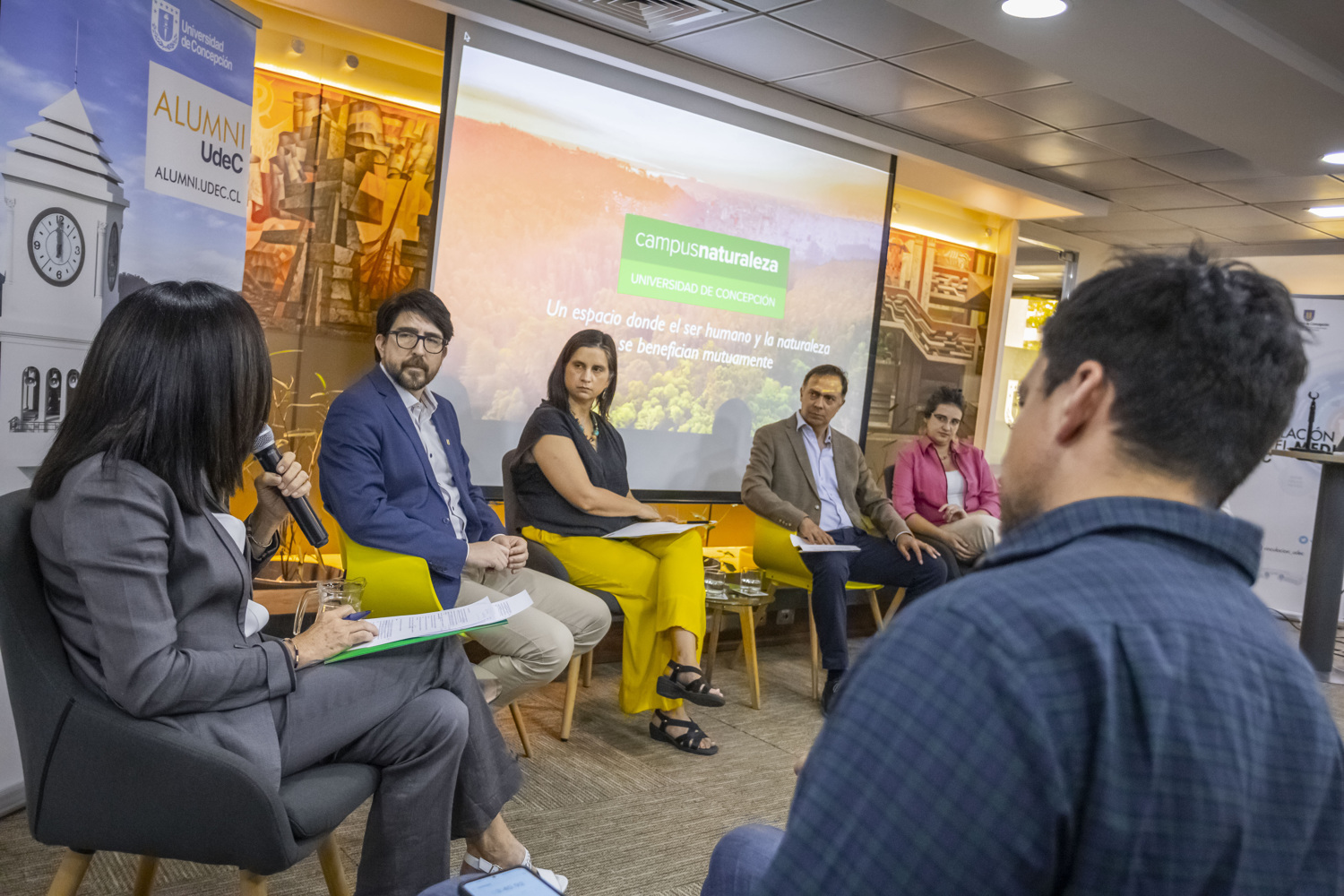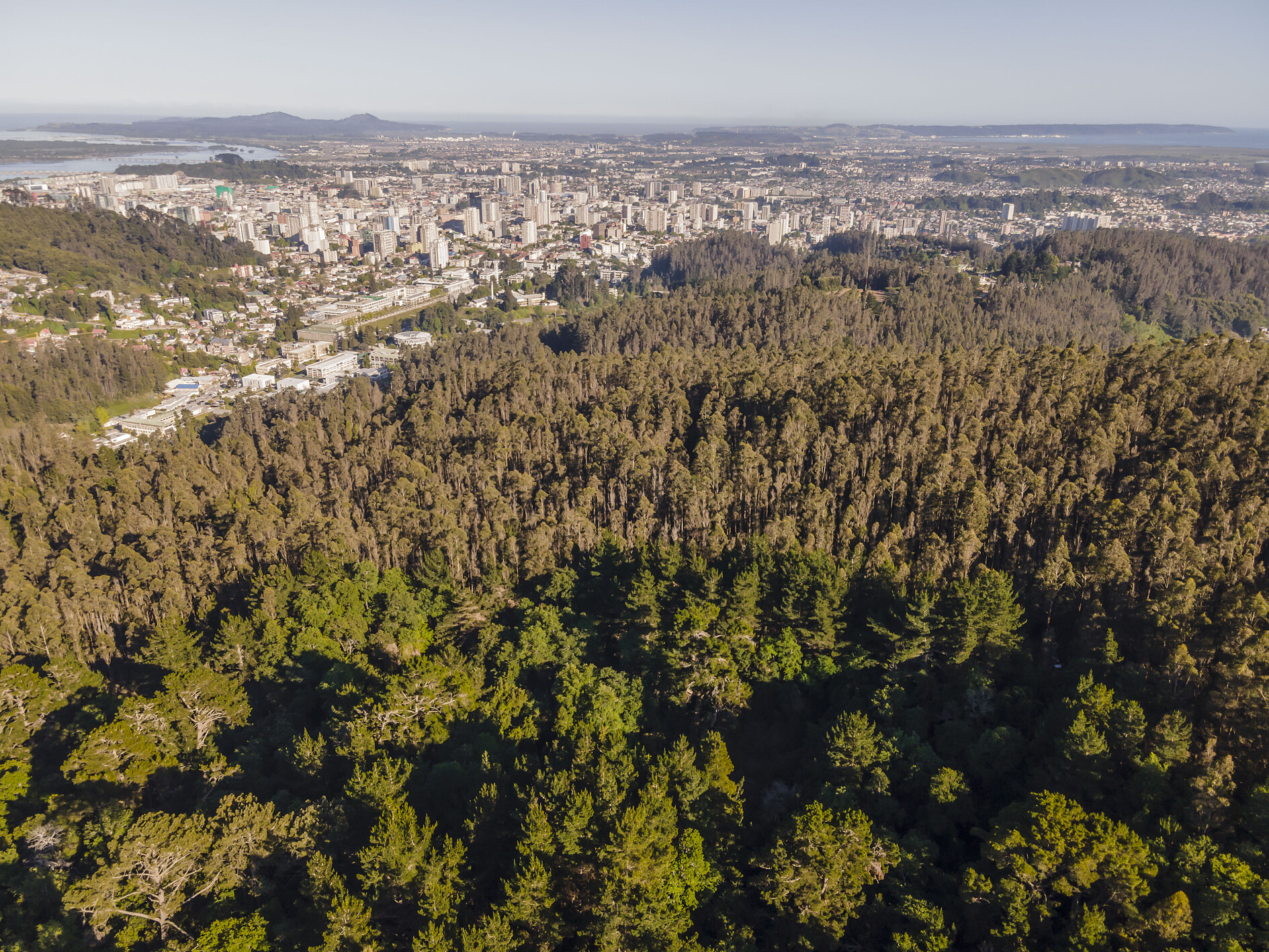Universities reflect on global environmental challenges and commitments.

The event, organized by the University of Concepción and held in Santiago, involved the participation of various stakeholders from the public, academic, private, and social sectors. The event also featured the presentation of the Campus Naturaleza Universidad de Concepción project, an initiative focused on biodiversity conservation and the benefits of continuous human interaction with the natural environment.
Themes such as how universities and various stakeholders are responding to current environmental challenges were part of the topics discussed in the panel discussion "Universities and meeting global environmental commitments." The event, held in Santiago, was organized by the Campus Naturaleza project in collaboration with the University of Concepción's Santiago campus.
Representatives from academia, the Ministry of Agriculture, the Ministry of Environment, the Council of Rectors of Chilean Universities, and business organizations gathered to discuss key questions related to climate change and sustainability, among other topics.
"The Rector of the University of Concepción, Dr. Carlos Saavedra Rubilar, stated: 'Universities are strongly committed to achieving the Sustainable Development Goals (SDGs) set in 2015, of which we are already halfway through. Unfortunately, we need to be honest and critical, but also committed to accelerating our progress and moving faster. In this context, universities are involved in at least 14 of these goals at different levels of action. One of these key objectives is the care and preservation of biodiversity on our planet.'"
He added that "'in this way, the Campus Naturaleza Universidad de Concepción project fulfills all dimensions of institutional work and will be pivotal in the educational processes of a variety of undergraduate and graduate programs, as well as continuing education, among others. It will generate new knowledge in different areas and will foster a deep connection not only for our students with their natural environment, but also for the surrounding communities of Campus Concepción, the Penquista community, the country, and, dare I say, the planet.'"
In the same vein, the Vice-Rector for Economic and Administrative Affairs, Miguel Quiroga, explained, 'Now begins the bidding process for the Master Plan of the Campus Naturaleza project, following a process where the bidding terms and other requirements were approved. This means that we will understand how we will operate from 2024 and in the long term.'

"This master plan should indicate to us where we should start locating each of these activities, among other subjects. So, as we continue to grow, we will also have a guide that will show us the different developments the project should undergo, in a planned manner," stated the academic authority.
On her part, Ignacia Fernández Gatica, Undersecretary of Agriculture, expressed, "We have a law that was passed, which sets a target for carbon neutrality by 2050, and certainly, it calls upon all of us more because it is a national goal. As the Ministry of Agriculture, we have significant challenges, and within this framework, there is a strong agenda focused on sustainability, meeting mitigation and adaptation goals to fulfill our commitments towards achieving carbon neutrality. It is also important to do this in a context where agriculture, particularly livestock farming and the forestry sector, among others, have goals that are aligned rather than conflicting, and to do so in an increasingly sustainable and environmentally friendly manner," emphasized the authority.
In turn, Dr. Mylthon Jiménez Castillo, Vice-Rector for Research and Development at the Universidad Austral de Chile and representative of the Chilean Universities Council (CRUCH), emphasized, "Universities are spaces of trust, where the community typically seeks support to make decisions at multiple levels. Moreover, within the CRUCH in general, we are committed to integrating these concepts into the students' education. They are called upon to confront complex environmental situations where sustainability, the country's commitments, and the actions of their own professions can bring about changes at various scales."
Biodiversity protection
Campus Naturaleza Universidad de Concepción is a groundbreaking national initiative that emphasizes biodiversity protection and the benefits of human interaction with the natural environment, among other aspects. In this regard, its director, Dr. Cristian Echeverría Leal, explained that within the context of global environmental commitments, Campus Naturaleza addresses a series of challenges, given that "many of our socio-ecological systems are at risk." He added that the project serves as "a window to observe the invaluable biodiversity that persists in the last remnants of coastal native forests adjacent to the university's Heritage Campus in Concepción."

"The lines of action converge on science as the cornerstone for developing a project that includes ex situ conservation initiatives (botanical garden with threatened Chilean species), ecological restoration, and scientific research to assist nature in its recovery journey," emphasized the academic.
He also explained that this initiative does not develop in isolation. "We understand that the community is a fundamental pillar for executing these actions. Therefore, our work has also been focused on raising awareness among people about how much we depend on a healthy and restored nature. Since the beginning of the project, we have worked with civil society actors to convey this imprint and build a social fabric that supports it into the future."
In relation to this, Daniela Manuschevich Vizcarra, Head of the Division of Natural Resources and Biodiversity at the Ministry of Environment, highlighted Campus Naturaleza for its connection with the environment. She added, "As we are able to connect science, spatial aspects, ecological and functional analysis, but also with something deeper within human beings, we are indeed aiming for these deeper connections to be more sustainable in the long term."
Additionally, Marcela Bravo Puldain, General Manager of Acción Empresas, stated that Campus Naturaleza UdeC is a highly innovative idea, "absolutely necessary to raise awareness among the population about the enormous impact biodiversity has on our lives and to feel and learn that we are nature, we are not separate. Therefore, from the business world, it is of tremendous value for a university to have this."
Finally, Suzanne Wylie Moir, Executive Director of Fundación Reforestemos, emphasized that the project represents a milestone in the history of education and universities in Chile. "Contributing with a nature campus to the Biobío region, particularly to Concepción, and to the rest of the country, is truly a very significant contribution. Not only environmentally, given the native forests and the unique biodiversity in that area and their impact on our environment, but also socially, because ultimately what these places do is bring together students, faculty, communities, neighbors, NGOs, and the private sector, which is essential."


